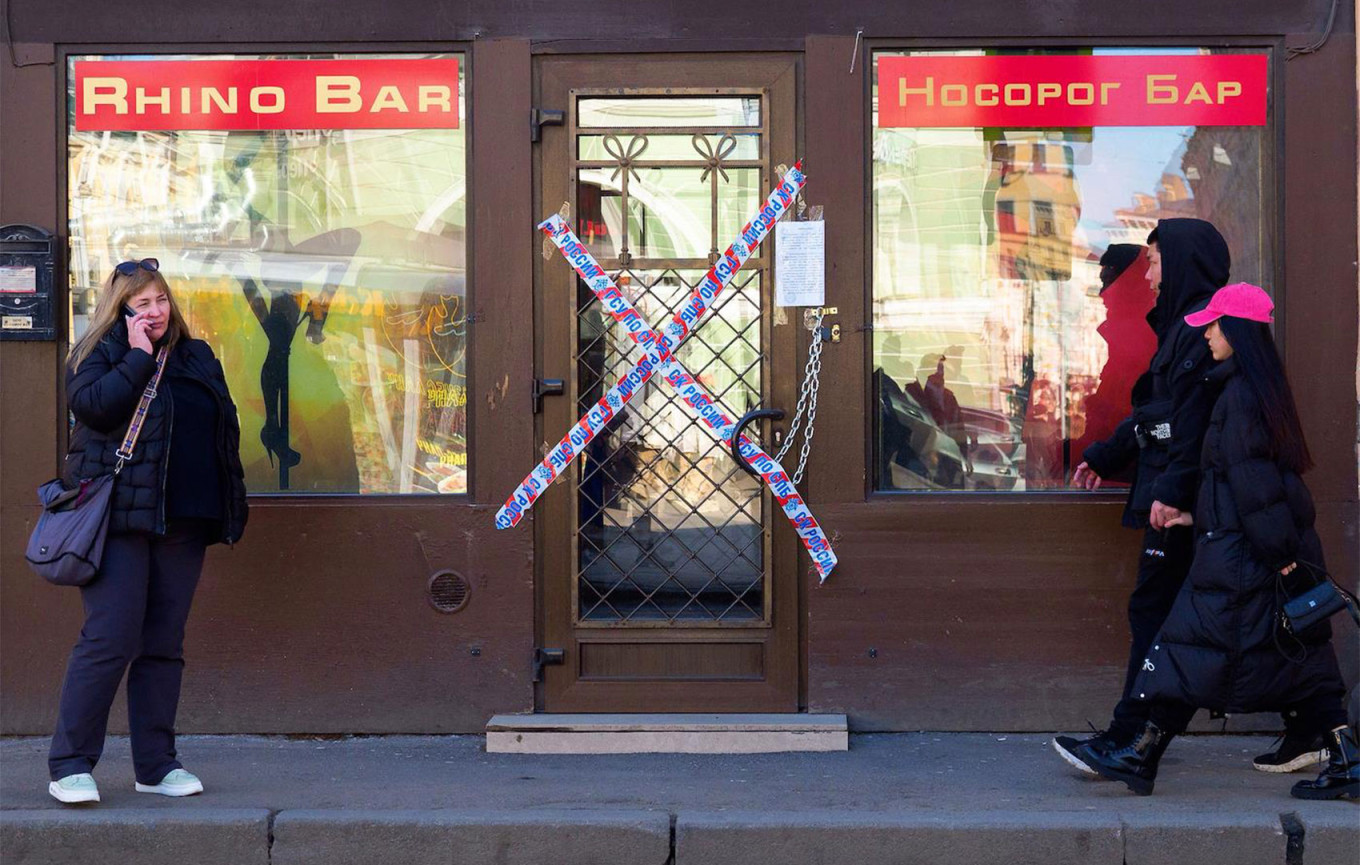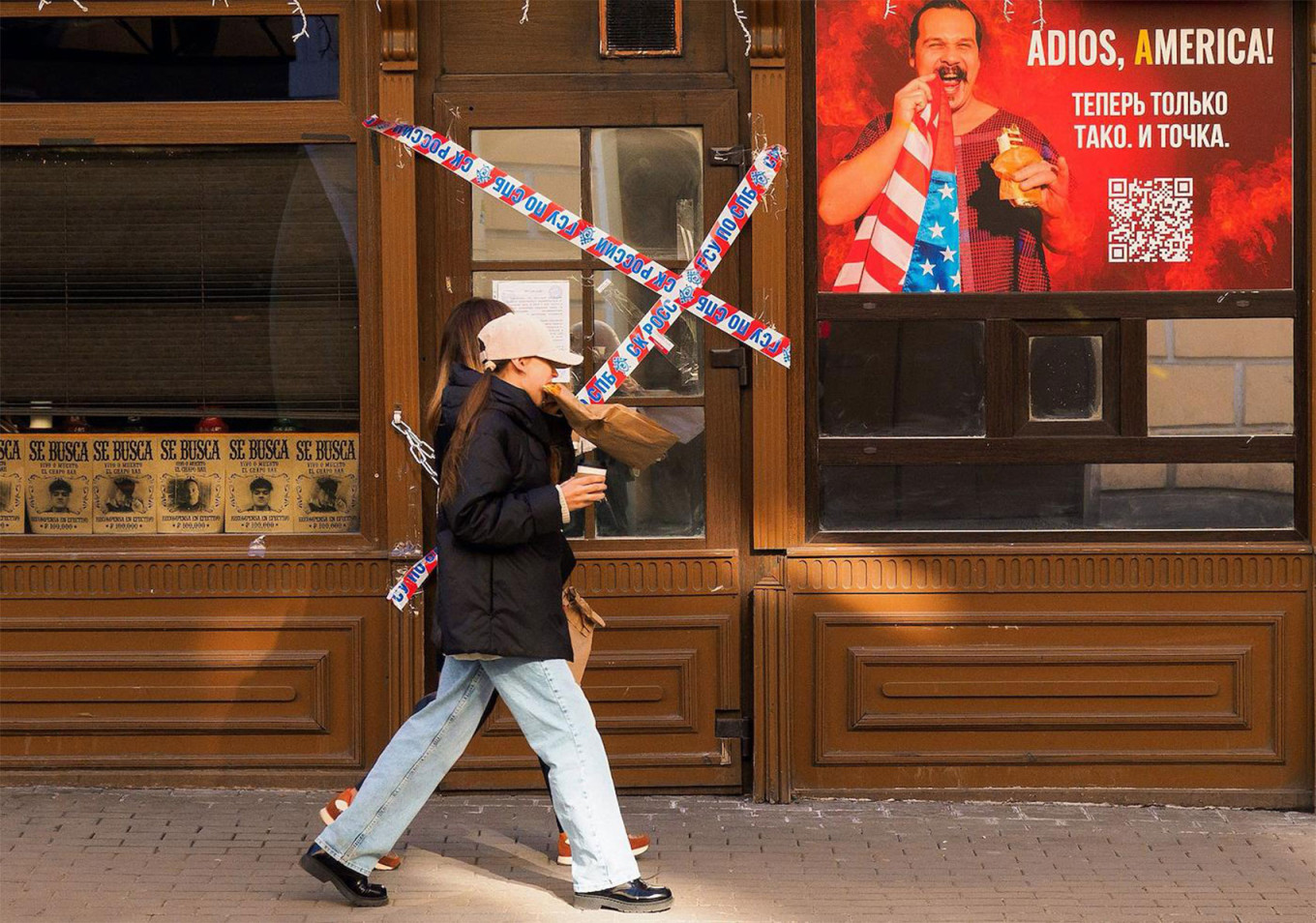Vasily Voronin was working as a bartender at the Blue Oyster bar on St. Petersburg’s Lomonosova Street one Friday night last month when security officers arrived to shut down all the bars and clubs in this nightlife hotspot.
“It wasn’t just the police,” Voronin, 26, told The Moscow Times.
“The Investigative Committee turned up as well, which was a shock. As soon as that lady walked through the door, we understood that this was something very bad. The Investigative Committee is a very serious organization.”
Since the raids on April 7, all 13 bars and clubs on Dumskaya and Lomonosova streets have been closed and the area — once a bustling destination for those seeking a cheap and wild night out — has been eerily quiet.
Venues are sealed off with police crime tape and walls and doors are plastered with notifications about an ongoing criminal investigation.
While officials said the closures were due to an investigation into underage drinking, staff and regulars at the bars and clubs on Lomonosova and Dumskaya told The Moscow Times that they believed the venues fell victim to Russia’s encroaching conservatism and the state’s eagerness to take a greater role in day-to-day life.
“I think it happened at this moment because of increased attention on the morality and moral appearance of Russian citizens,” said Nikolai, a Blue Oyster regular who witnessed the police raids and requested anonymity to speak freely.

“It’s like a kind of exorcism.”
The police and officers from the Investigative Committee — the Russian equivalent of the FBI — apparently searched all the drinkers and partiers at establishments on Lomonosova and Dumskaya on the night of the raid, in addition to breaking down at least one door into a bar that refused them entry.
Nikolai said he watched firefighters saw through locks on the doors of Dumskaya’s Ice Bar with angle-grinders.
According to Voronin, few people in Blue Oyster expressed much surprise when the police stormed in because such checks had become routine in recent months.
“Everyone was asked to show their passports because they wanted to find people that were under 18,” he said. “They didn’t find anyone, of course, because we make sure to check the ID of everyone who enters our club.”
While previous raids had resulted in brief closures for some venues, this time — with bars and clubs already shuttered for six weeks — it looks to be different.
Alexander Govorukhin, a bartender who had worked at Dumskaya’s Central Station club for eight years before the closure, told The Moscow Times this shutdown looks permanent.

“The police had turned up quite a few times recently, saying ‘Lads, tonight you won’t be working,’ and we would close and open the club the next night,” he said.
“Now, it’s clear they will never open the club again.”
Following the raids, an Investigative Committee spokesman said that a probe was underway into “systematic” underage drinking at venues in the area.
However, Voronin pointed out that police did not find anyone younger than 18 at the Blue Oyster. “They closed us down without any reason,” he said.
While two of the 13 bars and clubs that were closed by the police — Blue Oyster and Central Station — were prominent gay venues, activists do not appear to believe that the move was linked to anti-gay legislation passed by Russia late last year.
Other bars and clubs have also been targeted by law enforcement in Russia, with raids on Moscow establishments Underdog and La Virgen Taqueria earlier this year that saw visitors threatened with electric shock devices and forced to sing pro-Kremlin songs.
While the raids in Moscow were linked with the bars’ alleged opposition to the Russian invasion of Ukraine, in St. Petersburg, there is a widespread belief that the city authorities want to impose a conservative morality on the local nightlife.
Regular Nikolai admitted that Dumskaya and Lomonosova were often packed with throngs of intoxicated revelers, particularly on Friday and Saturday nights.
“You would often see a lot of irresponsible people in a state of alcohol and drug intoxication who committed various kinds of illegal acts, from damaging property to assault,” he said.
Dumskaya and Lomonosova streets are both very close to St. Petersburg’s major tourist attractions and clubgoers would often spill out in the small hours onto Nevksy Propsekt, the city’s major thoroughfare.
As it is unclear how long the police investigation will take, the shuttered clubs and bars will likely need to move to new locations if they wish to survive.
Sergei, who has years of experience working in clubs across the city and requested anonymity to speak freely, told The Moscow Times that the reason given by the authorities for the closure was just an excuse to make significant changes to the city’s appearance.
“The main reason for the closure of Dumskaya and Lomonosova is that the city needed space,” he said.
The authorities are planning to transform the much-loved yet disreputable strip into an “orderly” culture and dining district, local media reported last month.
“The clubs just fell victim to the machinery of our system,” said Sergei. “A system in which no one is seen, nothing is seen, and which decides everything.”





